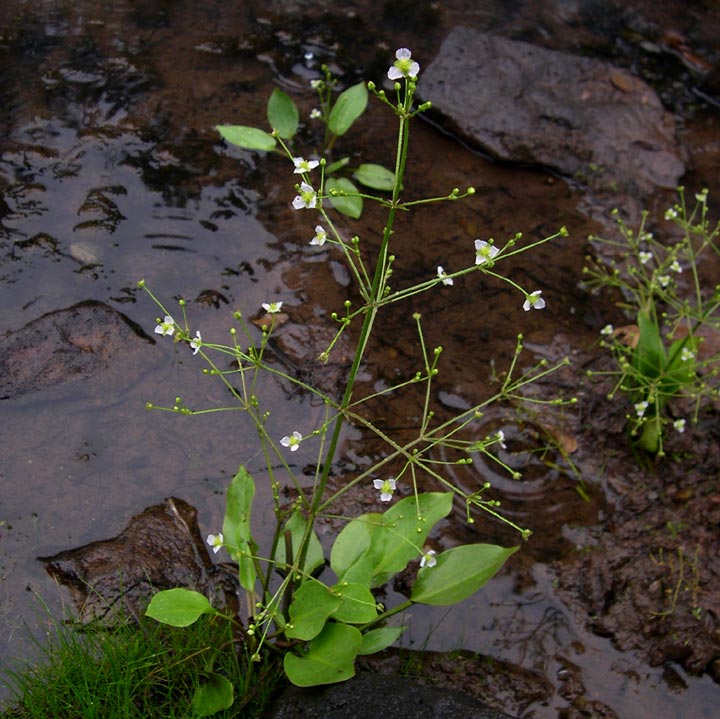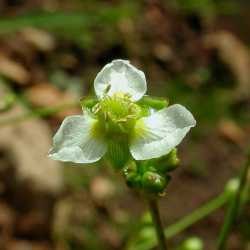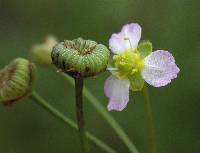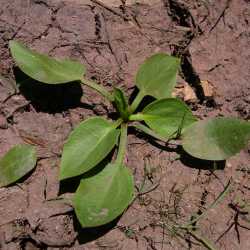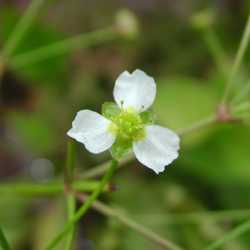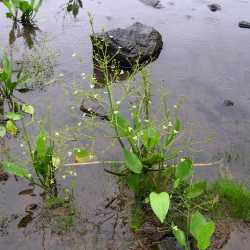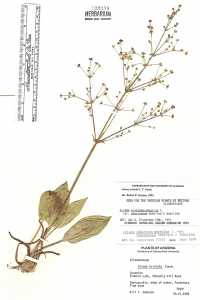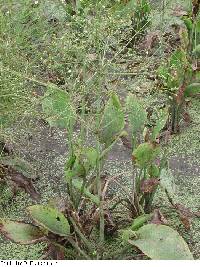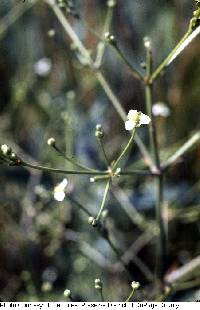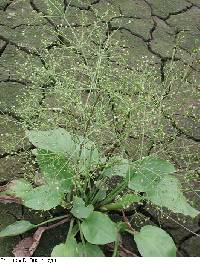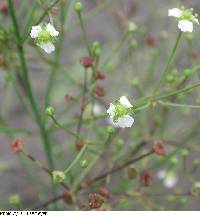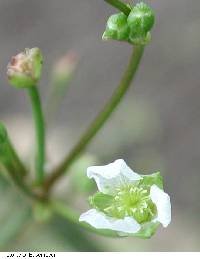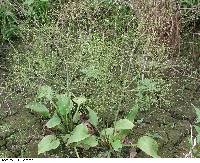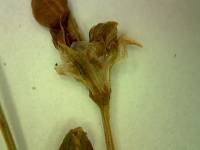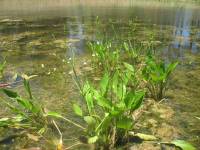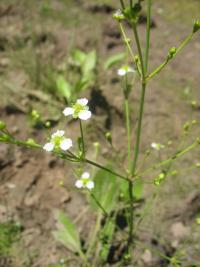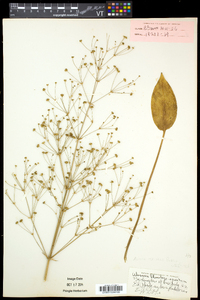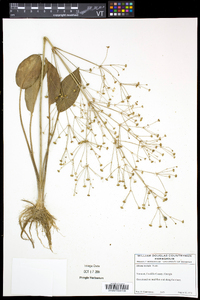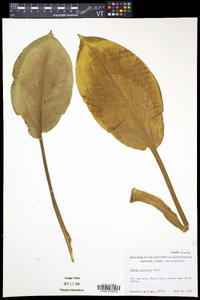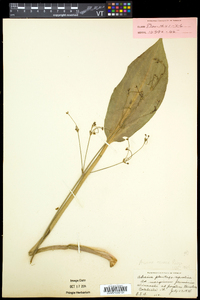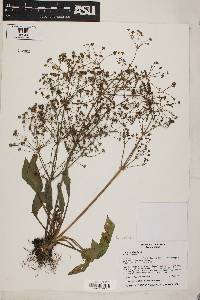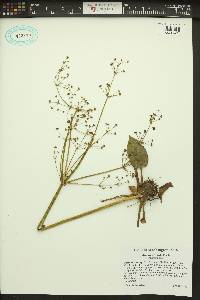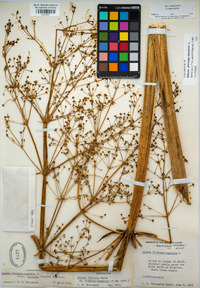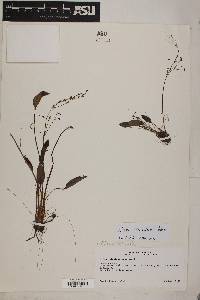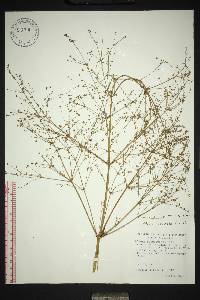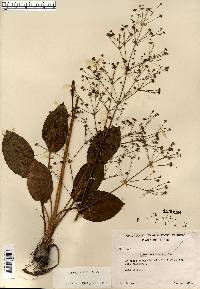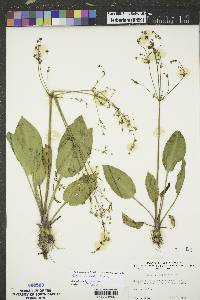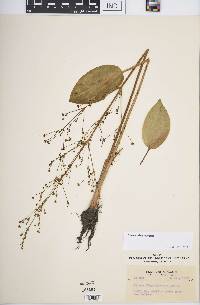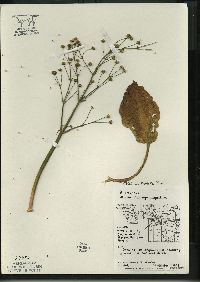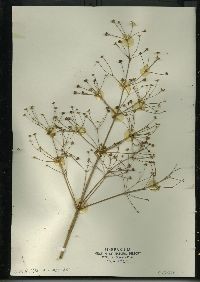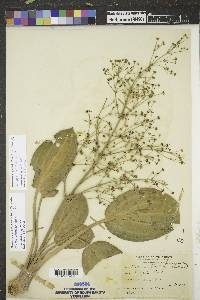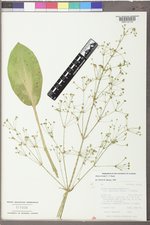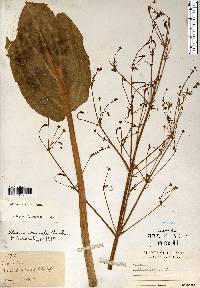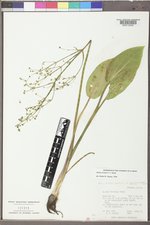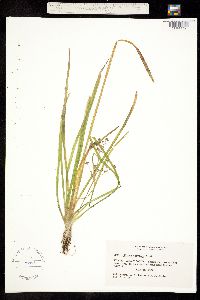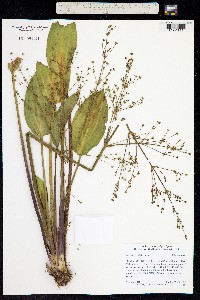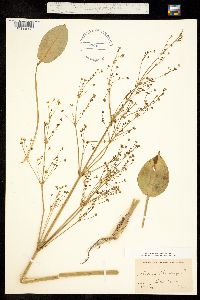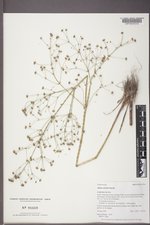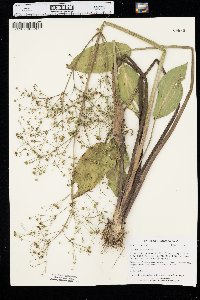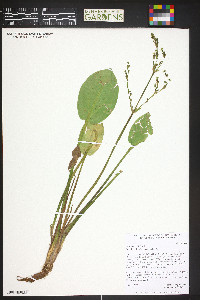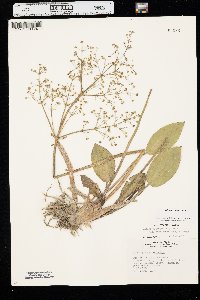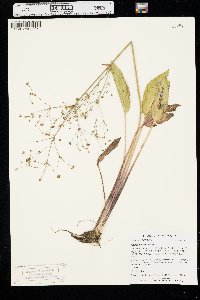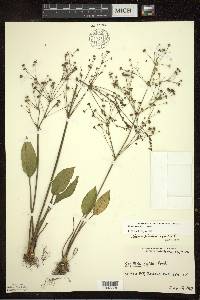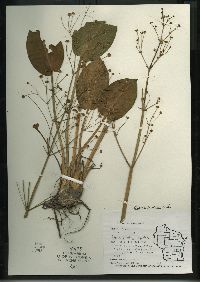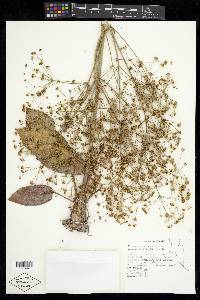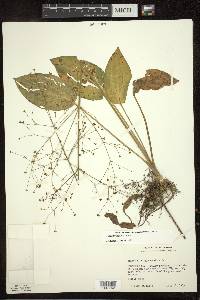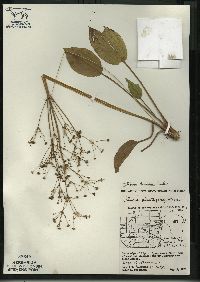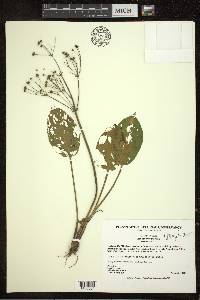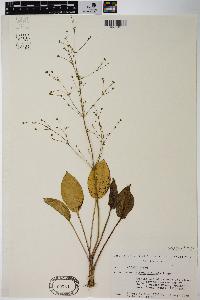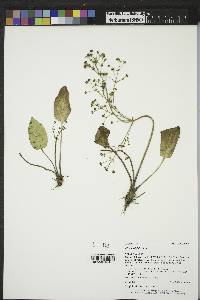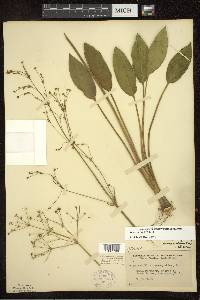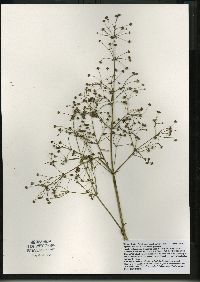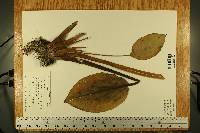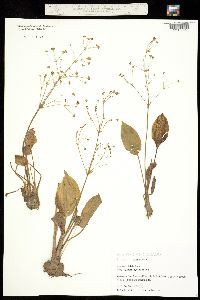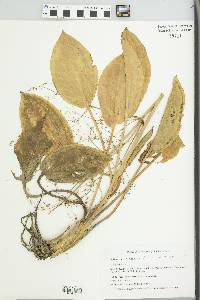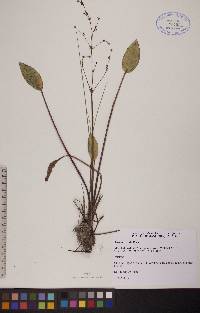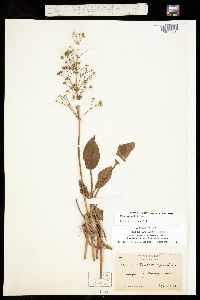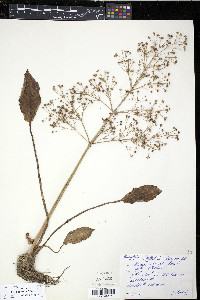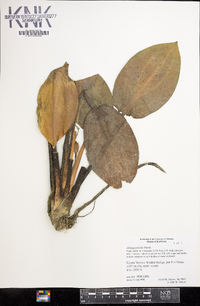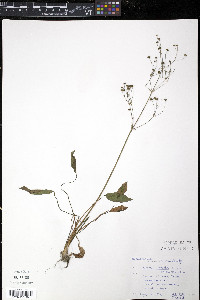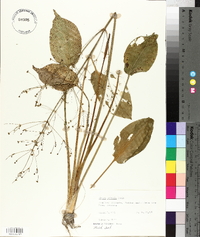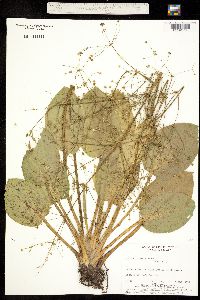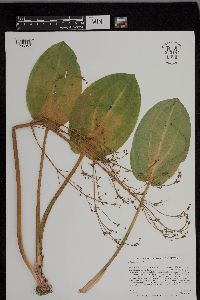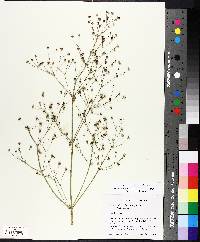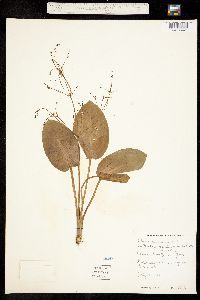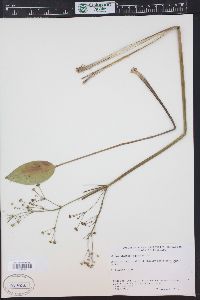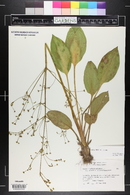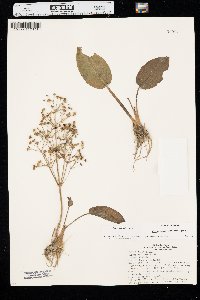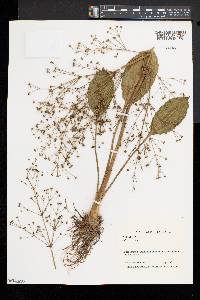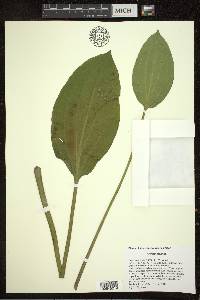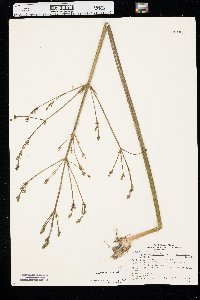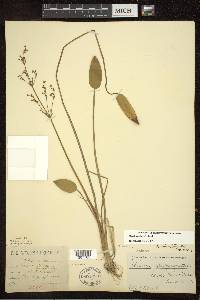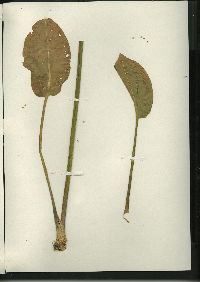
|
|
|
|
Family: Alismataceae
Northern Water-Plantain
[Alisma brevipes Greene, moreAlisma plantago-aquatica subsp. brevipes (Greene) Samuelsson, Alisma plantago-aquatica var. americanum J.A. Schultes, Alisma plantago-aquatica var. brevipes (Greene) Victorin, Alisma subcordatum var. superbum (Lunell) Lunell] |
Herbs, to 1 m. Leaves emersed, petiolate; blade linear-lanceolate to broadly elliptic or oval, to 35 ´ 3--12 cm. Inflorescences to 1 m. Flowers chasmogamous; sepals 3--6 mm; petals white, 3.5--6 mm, margins ± erose, apex obtuse; anthers ovoid, 0.6--1 mm; style ± curved, 0.4--0.6 mm, equal to ovary length. Fruiting heads 4.1--7 mm diam; achenes ovoid, 2.1--3 mm, abaxial keel broadly rounded with 1 median abaxial groove, beak erect or nearly erect. 2n = 28. Flowering spring--fall. Shallow muddy ponds, stream margins, marshes, and ditches; 0--2000 m; Alta., B.C., Man., N.B., Nfld. and Labr., N.W.T., N.S., Ont., P.E.I., Que., Sask.; Alaska, Ariz., Calif., Colo., Conn., Idaho, Ill., Ind., Iowa, Kans., Maine, Mass., Mich., Minn., Mont., Nebr., Nev., N.H., N.Mex., N.Y., N.Dak., Ohio, Okla., Oreg., Pa., R.I., S.Dak., Utah, Vt., Wash., Wis., Wyo.; n Mexico. I have seen no specimens from West Virginia, but although the species is to be expected there.
Perennial aquatic herb to 1 m tall Leaves: emersed, long- and triangular-stalked, 3 - 18 cm long, 2 - 12 cm wide, linear to broadly elliptic or oval with a rounded to slightly heart-shaped base. Inflorescence: loosely branched (panicle) on a stalk 10 cm to 1 m long. Flowers: arranged in whorls of three to ten; sepals 2 - 3 mm long; petals (three) white, 3.5 - 6 mm long, tip rounded, margin may be slightly unevenly cut. Fruit: a cluster of fifteen to 23 achenes arranged in a circle (4.1 - 7 mm across). Each achene is egg-shaped, 1.8 - 3 mm long, with an erect to slightly angled beak and a rounded outer edge with a single groove. Similar species: The similar Alisma subcordatum has flowers 2 - 4 mm across and achenes up to 2 mm long. Flowering: early July to late September Habitat and ecology: This species grows in marshes, shallow water, and ditches. It is less common than Alisma subcordatum and has a more northern distribution. Occurence in the Chicago region: native Etymology: Alisma is the classical Greek name for the water plantain. Triviale means "common." Author: The Morton Arboretum Martin and Hutchins 1980, Welsh et al. 1993, FNA 2000 Duration: Perennial Nativity: Native Lifeform: Forb/Herb General: Perennial from fibrous roots, 20-90 cm tall, leaves all basal but emersed. Leaves: Basal, ascending or erect, blades ovate to elliptic, cuneate to rounded or cordate at base, blade 4-17 cm long and 2-8 cm wide, shorter than inflorescence, blade on long petiole 2.5-30 cm long, sheathing. Flowers: Pyramidal compound panicle terminal on erect stiff scape, bracteate and longer than leaves, the floral bracts ovate, papery, 2-3 mm long with pedicels ascending to erect, 0.5-4 cm long, sepals greenish, 3-4 mm long, rounded ovate, broadly scarious margined, persistent; petals white, 3-6 mm long, 6 stamens, 10-22 pistils, in a single whorl, usually straight style. Fruits: Achene about 3 mm long. Ecology: Found in marshy areas, open water, wet meadows and mud flats from 4,000-8,000 ft (1219-2438 m); flowers June-August. Distribution: Ranges from the Sky Islands of Arizona north along the Mogollon rim, up through the Rockies to the Dakotas and into Canada. Notes: Distinguished from other Alisma by the wider leaf blades and the broadly scarious margins on the sepals, along with the flowers that are about 1 cm in diameter. Ethnobotany: Unknown Etymology: Alisma is from Greek name for a water plant, while triviale means common or ordinary. Synonyms: Alisma brevipes, Alisma plantago-aquatica subsp. brevipes, Alisma plantago-aquatica var. americanum, Alisma plantago-aquatica var. brevipes Editor: SBuckley, 2010 Rhizome 1-2 cm thick; lvs usually long-petioled, the blade elliptic to broadly ovate, rounded to subcordate at base, 3-18 נ2-12 cm, 1.5-2.5(-2.7) times as long as wide; scape 1-10 dm; pedicels in whorls of 3-10; sep obtuse, 2-3 mm; pet white, 3.8-4.5 נ3.0-3.9 mm, half again as long as the sep; style short, 0.4-0.6 mm, the stigmatic part ±curved; achenes 15-23, 1.8-3.0 mm, ordinarily with a median dorsal groove, rarely with 2 grooves as in no. 3 [Alisma gramineum Lej.]; 2n=28. Marshes, ponds, and streams; N.S. and e. Que. to Pa., w. to s. B.C., Mo., N.M., and Calif. June-Sept. (A. brevipes; A. plantago-aquatica var. americanum) Gleason, Henry A. & Cronquist, Arthur J. 1991. Manual of vascular plants of northeastern United States and adjacent Canada. lxxv + 910 pp. ©The New York Botanical Garden. All rights reserved. Used by permission. From Flora of Indiana (1940) by Charles C. Deam Found only in our northern counties with the habitat of the preceding species. This species was unknown to me until I studied my specimens. It is probable that now since I know it, I could find it in more of our northern counties. I have specimens from Lake, Elkhart, and Newton Counties. This is the boreal representative of the genus. ...... Indiana Coefficient of Conservatism: C = 2 Wetland Indicator Status: OBL Diagnostic Traits: Similar to Alisma subcordata but with larger flowers and fruits. Larger flowers >4 mm broad; sepals 3-6 mm; achenes >2.2 mm. |
|
|
|
This project was made possible in part by the Institute of Museum and Library Services [MG-70-19-0057-19].
Powered by Symbiota

